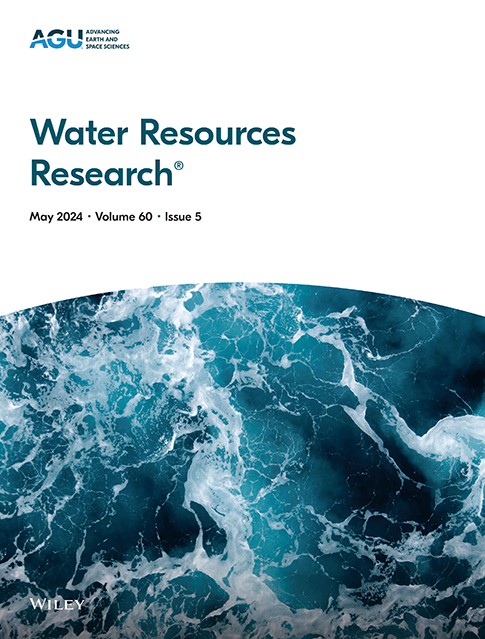A Monte Carlo Propagation of the Full Variance-Covariance of GRACE-Like Level-2 Data With Applications in Hydrological Data Assimilation and Sea-Level Budget Studies
IF 4.6
1区 地球科学
Q2 ENVIRONMENTAL SCIENCES
引用次数: 0
Abstract
Understanding mass (re-)distribution within the Earth system, and addressing global challenges such as the impact of climate change on water resources requires global time-variable terrestrial water storage (TWS) estimates along with reasonable uncertainty fields. The Gravity Recovery and Climate Experiment (GRACE) and GRACE-FO satellite missions provide time-variable gravity fields with full variance-covariance information. A rigorous uncertainty propagation of these errors to TWS uncertainties is mathematically challenging and computationally inefficient. We propose a Monte Carlo Full Variance-Covariance (MCFVC) error propagation approach to precisely compute TWS uncertainties. We also establish theoretical criteria to predict the actual convergence and accuracy of MCFVC, showing a convergence after 10,000 realizations with the relative error of 2.8% for variance and 4.7% for covariance at the confidence level of 95%. This can be achieved in few seconds using a single CPU to compute the uncertainties of each 1° resolution globally gridded TWS field. A validation against the rigorous error propagation method indicates relative differences of less than 0.8%. A global uncertainty assessment shows that neglecting the covariance of gravity coefficients can considerably bias the TWS uncertainties, that is, up to 60%, in some basins like Eyre. Flexibility of MCFVC allows the quantification of filtering impacts on the uncertainty of TWS fields, for example, up to 35% in the Tocantins River Basin. An empirical model is provided to reproduce GRACE-like TWS uncertainty fields for hydrological studies. Finally, experiments of GRACE(-FO) data assimilation for hydrological applications and sea-level budget estimation are presented that indicate the importance of accounting for the full covariance information in these studies.GRACE-Like Level-2 数据全方差-协方差的蒙特卡洛传播及其在水文数据同化和海平面预算研究中的应用
要了解地球系统内的质量(再)分布,并应对气候变化对水资源的影响等全球性挑战,就需要全球可变时间陆地储水量(TWS)估算值以及合理的不确定性场。重力恢复与气候实验(GRACE)和 GRACE-FO 卫星任务提供了具有完整方差-协方差信息的时变重力场。将这些误差严格不确定性传播到 TWS 不确定性中在数学上具有挑战性,在计算上也效率低下。我们提出了蒙特卡洛全方差-协方差(MCFVC)误差传播方法,以精确计算 TWS 不确定性。我们还建立了理论标准来预测 MCFVC 的实际收敛性和准确性,结果表明,在置信度为 95% 的情况下,经过 10,000 次实现后,方差的相对误差为 2.8%,协方差的相对误差为 4.7%。使用单个 CPU 计算每个 1° 分辨率全球网格化 TWS 场的不确定性只需几秒钟。根据严格的误差传播方法进行的验证表明,相对差异小于 0.8%。全球不确定性评估表明,忽略重力系数的协方差会对 TWS 的不确定性产生相当大的偏差,在某些盆地(如艾尔),偏差可达 60%。MCFVC 的灵活性允许量化滤波对 TWS 场不确定性的影响,例如,在托坎廷斯河流域,滤波对 TWS 场不确定性的影响高达 35%。为水文研究提供了一个经验模型,用于再现类似于 GRACE 的 TWS 不确定性场。最后,介绍了用于水文应用和海平面预算估计的 GRACE(-FO)数据同化实验,表明在这些研究中考虑全部协方差信息的重要性。
本文章由计算机程序翻译,如有差异,请以英文原文为准。
求助全文
约1分钟内获得全文
求助全文
来源期刊

Water Resources Research
环境科学-湖沼学
CiteScore
8.80
自引率
13.00%
发文量
599
审稿时长
3.5 months
期刊介绍:
Water Resources Research (WRR) is an interdisciplinary journal that focuses on hydrology and water resources. It publishes original research in the natural and social sciences of water. It emphasizes the role of water in the Earth system, including physical, chemical, biological, and ecological processes in water resources research and management, including social, policy, and public health implications. It encompasses observational, experimental, theoretical, analytical, numerical, and data-driven approaches that advance the science of water and its management. Submissions are evaluated for their novelty, accuracy, significance, and broader implications of the findings.
 求助内容:
求助内容: 应助结果提醒方式:
应助结果提醒方式:


